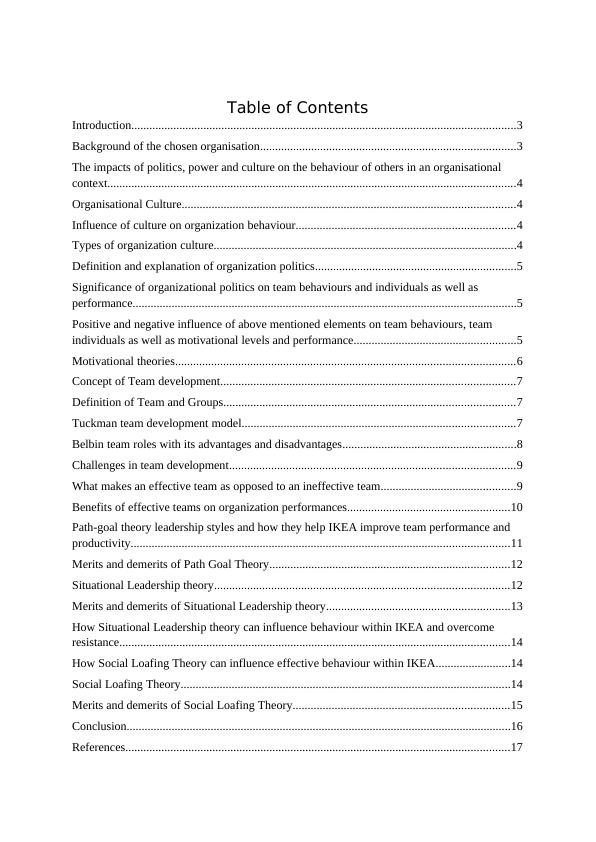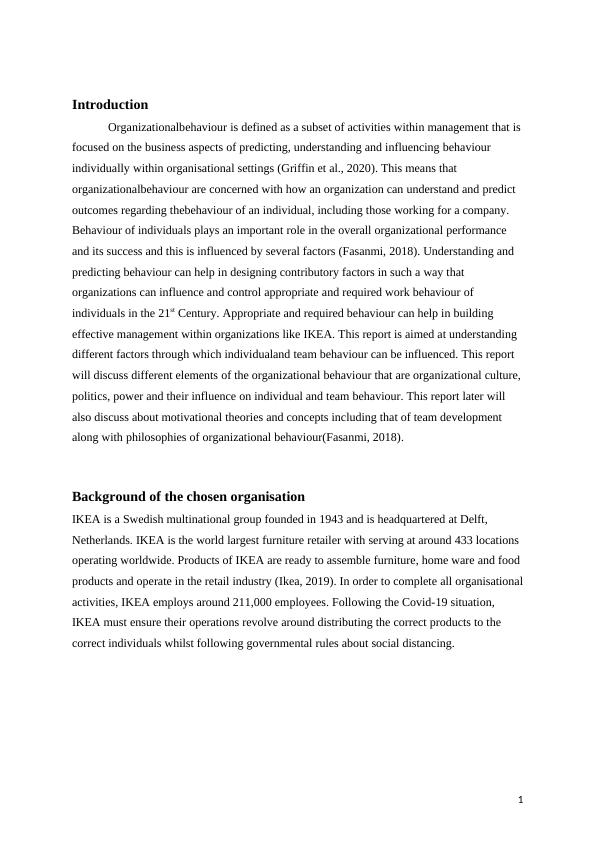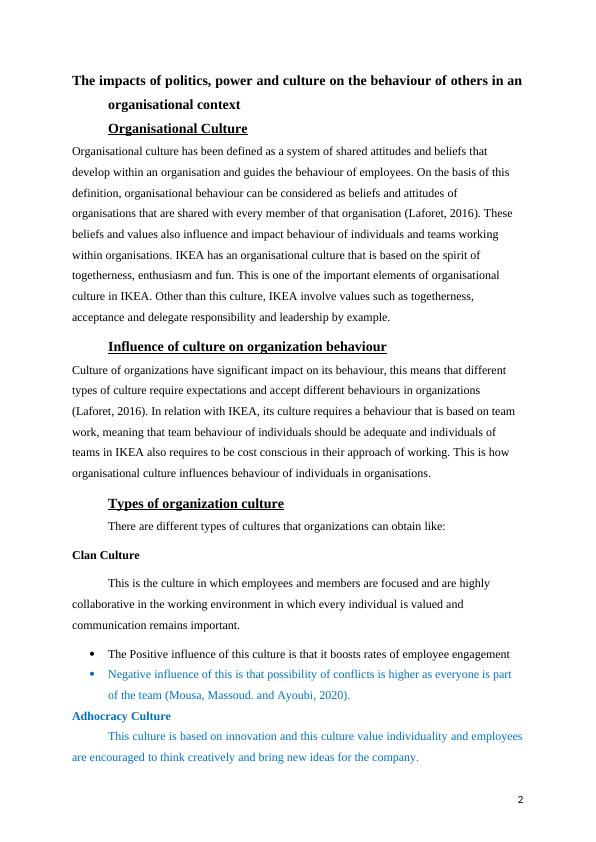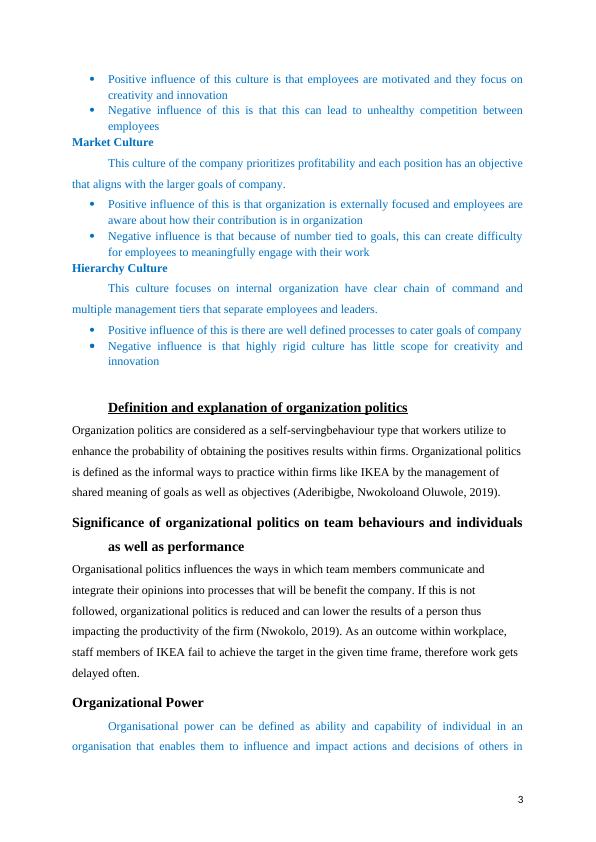Impacts of Politics, Power, and Culture on Organizational Behavior
Added on 2023-01-06
19 Pages6506 Words42 Views
Table of Contents
Introduction................................................................................................................................3
Background of the chosen organisation.....................................................................................3
The impacts of politics, power and culture on the behaviour of others in an organisational
context........................................................................................................................................4
Organisational Culture...............................................................................................................4
Influence of culture on organization behaviour.........................................................................4
Types of organization culture.....................................................................................................4
Definition and explanation of organization politics...................................................................5
Significance of organizational politics on team behaviours and individuals as well as
performance................................................................................................................................5
Positive and negative influence of above mentioned elements on team behaviours, team
individuals as well as motivational levels and performance......................................................5
Motivational theories.................................................................................................................6
Concept of Team development..................................................................................................7
Definition of Team and Groups.................................................................................................7
Tuckman team development model...........................................................................................7
Belbin team roles with its advantages and disadvantages..........................................................8
Challenges in team development...............................................................................................9
What makes an effective team as opposed to an ineffective team.............................................9
Benefits of effective teams on organization performances......................................................10
Path-goal theory leadership styles and how they help IKEA improve team performance and
productivity..............................................................................................................................11
Merits and demerits of Path Goal Theory................................................................................12
Situational Leadership theory..................................................................................................12
Merits and demerits of Situational Leadership theory.............................................................13
How Situational Leadership theory can influence behaviour within IKEA and overcome
resistance..................................................................................................................................14
How Social Loafing Theory can influence effective behaviour within IKEA.........................14
Social Loafing Theory..............................................................................................................14
Merits and demerits of Social Loafing Theory........................................................................15
Conclusion................................................................................................................................16
References................................................................................................................................17
Introduction................................................................................................................................3
Background of the chosen organisation.....................................................................................3
The impacts of politics, power and culture on the behaviour of others in an organisational
context........................................................................................................................................4
Organisational Culture...............................................................................................................4
Influence of culture on organization behaviour.........................................................................4
Types of organization culture.....................................................................................................4
Definition and explanation of organization politics...................................................................5
Significance of organizational politics on team behaviours and individuals as well as
performance................................................................................................................................5
Positive and negative influence of above mentioned elements on team behaviours, team
individuals as well as motivational levels and performance......................................................5
Motivational theories.................................................................................................................6
Concept of Team development..................................................................................................7
Definition of Team and Groups.................................................................................................7
Tuckman team development model...........................................................................................7
Belbin team roles with its advantages and disadvantages..........................................................8
Challenges in team development...............................................................................................9
What makes an effective team as opposed to an ineffective team.............................................9
Benefits of effective teams on organization performances......................................................10
Path-goal theory leadership styles and how they help IKEA improve team performance and
productivity..............................................................................................................................11
Merits and demerits of Path Goal Theory................................................................................12
Situational Leadership theory..................................................................................................12
Merits and demerits of Situational Leadership theory.............................................................13
How Situational Leadership theory can influence behaviour within IKEA and overcome
resistance..................................................................................................................................14
How Social Loafing Theory can influence effective behaviour within IKEA.........................14
Social Loafing Theory..............................................................................................................14
Merits and demerits of Social Loafing Theory........................................................................15
Conclusion................................................................................................................................16
References................................................................................................................................17

Introduction
Organizationalbehaviour is defined as a subset of activities within management that is
focused on the business aspects of predicting, understanding and influencing behaviour
individually within organisational settings (Griffin et al., 2020). This means that
organizationalbehaviour are concerned with how an organization can understand and predict
outcomes regarding thebehaviour of an individual, including those working for a company.
Behaviour of individuals plays an important role in the overall organizational performance
and its success and this is influenced by several factors (Fasanmi, 2018). Understanding and
predicting behaviour can help in designing contributory factors in such a way that
organizations can influence and control appropriate and required work behaviour of
individuals in the 21st Century. Appropriate and required behaviour can help in building
effective management within organizations like IKEA. This report is aimed at understanding
different factors through which individualand team behaviour can be influenced. This report
will discuss different elements of the organizational behaviour that are organizational culture,
politics, power and their influence on individual and team behaviour. This report later will
also discuss about motivational theories and concepts including that of team development
along with philosophies of organizational behaviour(Fasanmi, 2018).
Background of the chosen organisation
IKEA is a Swedish multinational group founded in 1943 and is headquartered at Delft,
Netherlands. IKEA is the world largest furniture retailer with serving at around 433 locations
operating worldwide. Products of IKEA are ready to assemble furniture, home ware and food
products and operate in the retail industry (Ikea, 2019). In order to complete all organisational
activities, IKEA employs around 211,000 employees. Following the Covid-19 situation,
IKEA must ensure their operations revolve around distributing the correct products to the
correct individuals whilst following governmental rules about social distancing.
1
Organizationalbehaviour is defined as a subset of activities within management that is
focused on the business aspects of predicting, understanding and influencing behaviour
individually within organisational settings (Griffin et al., 2020). This means that
organizationalbehaviour are concerned with how an organization can understand and predict
outcomes regarding thebehaviour of an individual, including those working for a company.
Behaviour of individuals plays an important role in the overall organizational performance
and its success and this is influenced by several factors (Fasanmi, 2018). Understanding and
predicting behaviour can help in designing contributory factors in such a way that
organizations can influence and control appropriate and required work behaviour of
individuals in the 21st Century. Appropriate and required behaviour can help in building
effective management within organizations like IKEA. This report is aimed at understanding
different factors through which individualand team behaviour can be influenced. This report
will discuss different elements of the organizational behaviour that are organizational culture,
politics, power and their influence on individual and team behaviour. This report later will
also discuss about motivational theories and concepts including that of team development
along with philosophies of organizational behaviour(Fasanmi, 2018).
Background of the chosen organisation
IKEA is a Swedish multinational group founded in 1943 and is headquartered at Delft,
Netherlands. IKEA is the world largest furniture retailer with serving at around 433 locations
operating worldwide. Products of IKEA are ready to assemble furniture, home ware and food
products and operate in the retail industry (Ikea, 2019). In order to complete all organisational
activities, IKEA employs around 211,000 employees. Following the Covid-19 situation,
IKEA must ensure their operations revolve around distributing the correct products to the
correct individuals whilst following governmental rules about social distancing.
1

The impacts of politics, power and culture on the behaviour of others in an
organisational context
Organisational Culture
Organisational culture has been defined as a system of shared attitudes and beliefs that
develop within an organisation and guides the behaviour of employees. On the basis of this
definition, organisational behaviour can be considered as beliefs and attitudes of
organisations that are shared with every member of that organisation (Laforet, 2016). These
beliefs and values also influence and impact behaviour of individuals and teams working
within organisations. IKEA has an organisational culture that is based on the spirit of
togetherness, enthusiasm and fun. This is one of the important elements of organisational
culture in IKEA. Other than this culture, IKEA involve values such as togetherness,
acceptance and delegate responsibility and leadership by example.
Influence of culture on organization behaviour
Culture of organizations have significant impact on its behaviour, this means that different
types of culture require expectations and accept different behaviours in organizations
(Laforet, 2016). In relation with IKEA, its culture requires a behaviour that is based on team
work, meaning that team behaviour of individuals should be adequate and individuals of
teams in IKEA also requires to be cost conscious in their approach of working. This is how
organisational culture influences behaviour of individuals in organisations.
Types of organization culture
There are different types of cultures that organizations can obtain like:
Clan Culture
This is the culture in which employees and members are focused and are highly
collaborative in the working environment in which every individual is valued and
communication remains important.
The Positive influence of this culture is that it boosts rates of employee engagement
Negative influence of this is that possibility of conflicts is higher as everyone is part
of the team (Mousa, Massoud. and Ayoubi, 2020).
Adhocracy Culture
This culture is based on innovation and this culture value individuality and employees
are encouraged to think creatively and bring new ideas for the company.
2
organisational context
Organisational Culture
Organisational culture has been defined as a system of shared attitudes and beliefs that
develop within an organisation and guides the behaviour of employees. On the basis of this
definition, organisational behaviour can be considered as beliefs and attitudes of
organisations that are shared with every member of that organisation (Laforet, 2016). These
beliefs and values also influence and impact behaviour of individuals and teams working
within organisations. IKEA has an organisational culture that is based on the spirit of
togetherness, enthusiasm and fun. This is one of the important elements of organisational
culture in IKEA. Other than this culture, IKEA involve values such as togetherness,
acceptance and delegate responsibility and leadership by example.
Influence of culture on organization behaviour
Culture of organizations have significant impact on its behaviour, this means that different
types of culture require expectations and accept different behaviours in organizations
(Laforet, 2016). In relation with IKEA, its culture requires a behaviour that is based on team
work, meaning that team behaviour of individuals should be adequate and individuals of
teams in IKEA also requires to be cost conscious in their approach of working. This is how
organisational culture influences behaviour of individuals in organisations.
Types of organization culture
There are different types of cultures that organizations can obtain like:
Clan Culture
This is the culture in which employees and members are focused and are highly
collaborative in the working environment in which every individual is valued and
communication remains important.
The Positive influence of this culture is that it boosts rates of employee engagement
Negative influence of this is that possibility of conflicts is higher as everyone is part
of the team (Mousa, Massoud. and Ayoubi, 2020).
Adhocracy Culture
This culture is based on innovation and this culture value individuality and employees
are encouraged to think creatively and bring new ideas for the company.
2

Positive influence of this culture is that employees are motivated and they focus on
creativity and innovation
Negative influence of this is that this can lead to unhealthy competition between
employees
Market Culture
This culture of the company prioritizes profitability and each position has an objective
that aligns with the larger goals of company.
Positive influence of this is that organization is externally focused and employees are
aware about how their contribution is in organization
Negative influence is that because of number tied to goals, this can create difficulty
for employees to meaningfully engage with their work
Hierarchy Culture
This culture focuses on internal organization have clear chain of command and
multiple management tiers that separate employees and leaders.
Positive influence of this is there are well defined processes to cater goals of company
Negative influence is that highly rigid culture has little scope for creativity and
innovation
Definition and explanation of organization politics
Organization politics are considered as a self-servingbehaviour type that workers utilize to
enhance the probability of obtaining the positives results within firms. Organizational politics
is defined as the informal ways to practice within firms like IKEA by the management of
shared meaning of goals as well as objectives (Aderibigbe, Nwokoloand Oluwole, 2019).
Significance of organizational politics on team behaviours and individuals
as well as performance
Organisational politics influences the ways in which team members communicate and
integrate their opinions into processes that will be benefit the company. If this is not
followed, organizational politics is reduced and can lower the results of a person thus
impacting the productivity of the firm (Nwokolo, 2019). As an outcome within workplace,
staff members of IKEA fail to achieve the target in the given time frame, therefore work gets
delayed often.
Organizational Power
Organisational power can be defined as ability and capability of individual in an
organisation that enables them to influence and impact actions and decisions of others in
3
creativity and innovation
Negative influence of this is that this can lead to unhealthy competition between
employees
Market Culture
This culture of the company prioritizes profitability and each position has an objective
that aligns with the larger goals of company.
Positive influence of this is that organization is externally focused and employees are
aware about how their contribution is in organization
Negative influence is that because of number tied to goals, this can create difficulty
for employees to meaningfully engage with their work
Hierarchy Culture
This culture focuses on internal organization have clear chain of command and
multiple management tiers that separate employees and leaders.
Positive influence of this is there are well defined processes to cater goals of company
Negative influence is that highly rigid culture has little scope for creativity and
innovation
Definition and explanation of organization politics
Organization politics are considered as a self-servingbehaviour type that workers utilize to
enhance the probability of obtaining the positives results within firms. Organizational politics
is defined as the informal ways to practice within firms like IKEA by the management of
shared meaning of goals as well as objectives (Aderibigbe, Nwokoloand Oluwole, 2019).
Significance of organizational politics on team behaviours and individuals
as well as performance
Organisational politics influences the ways in which team members communicate and
integrate their opinions into processes that will be benefit the company. If this is not
followed, organizational politics is reduced and can lower the results of a person thus
impacting the productivity of the firm (Nwokolo, 2019). As an outcome within workplace,
staff members of IKEA fail to achieve the target in the given time frame, therefore work gets
delayed often.
Organizational Power
Organisational power can be defined as ability and capability of individual in an
organisation that enables them to influence and impact actions and decisions of others in
3

End of preview
Want to access all the pages? Upload your documents or become a member.
Related Documents
Impacts of Culture, Politics, and Power on Organizational Behaviorlg...
|22
|6868
|62
Impact of Power, Culture, and Politics on Organizational Behaviourlg...
|17
|5104
|36
Impact of Culture, Power and Politics on Employee Performancelg...
|16
|4387
|91
Influence of Culture, Politics and Power on Organizational Behaviourlg...
|16
|5211
|57
M1 Analysis of cultural, political and power influence on performancelg...
|15
|4723
|63
Organisation Behaviour: Impact of Culture, Politics and Power on Performancelg...
|13
|4825
|54
